


CHINESE NEW YEAR 2019
© Malvin Artley
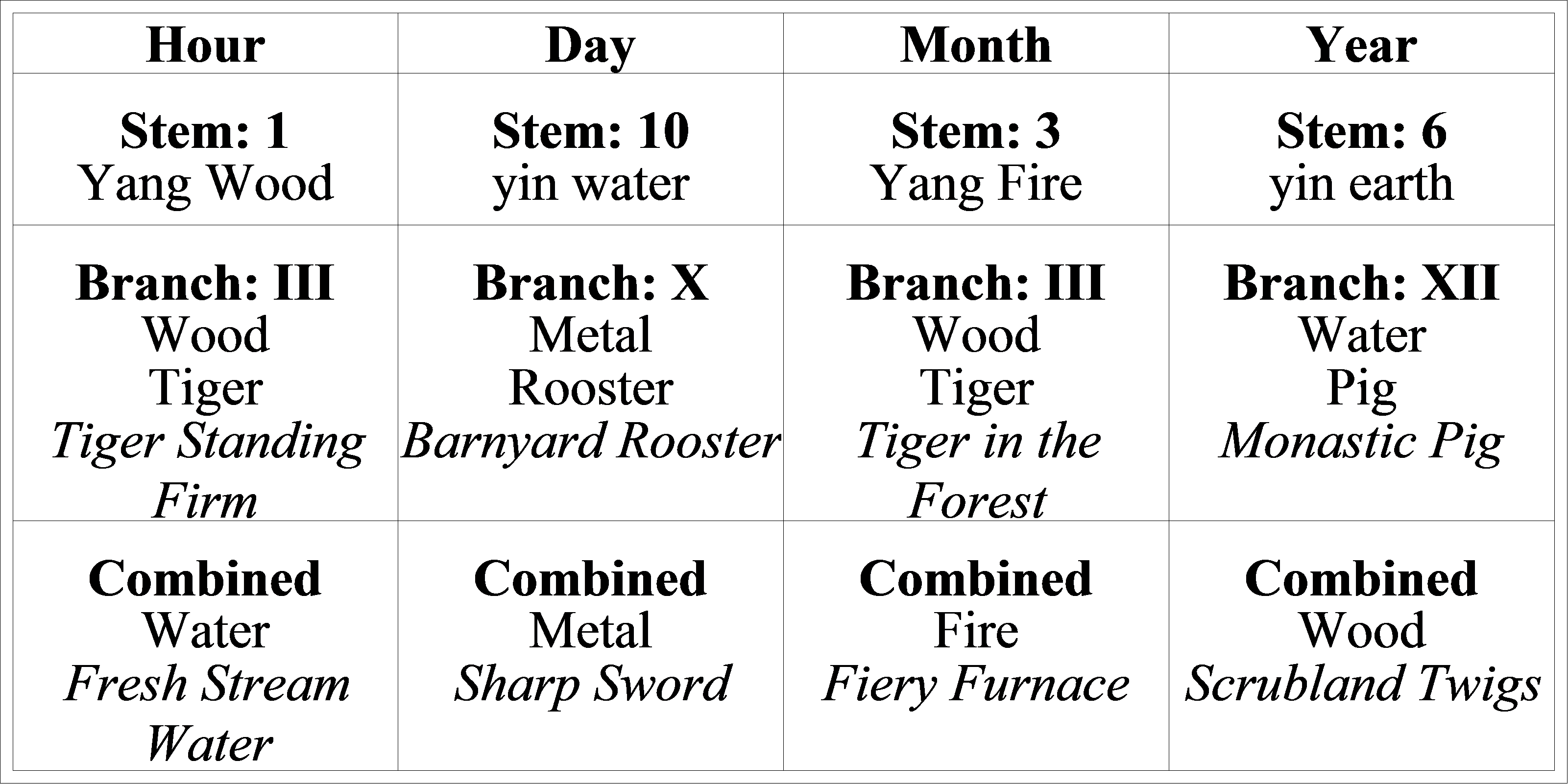
Additional info listed at the end of this letter
Date/Time: 5 Feb 2019, 5:03 am (AWST -8:00)
Li Ch'un (Start of the Chinese Solar Year): 4 Feb 2019 11:14 am (CCT -8:00)
Tetragram 11: Divergence: Yang chi, wriggling, breaks through, newly emerged, greeted by the Great Yang. All things are of mistaken appearance. 5 Feb (Nighttime): Strong desires, so attached, that which is undesired bears fruit.
__________
Gong Hey Fat Choy, Everyone!
 And Happy Losar if you are Buddhist! Starting on the 5th we officially enter the Year of the Earth Pig, known poetically as the “Monastic Pig”. This follows upon what has been an extraordinary Year of the Mountain Dog, which we will get to in due course. However, even though this is a yin year its effects will be no less powerful. They will just be powerful in a different manner. This time instead of being overt, as we saw with the yang year last year, the coming changes this year will be more foundational, or inner, as we would expect from yin. But the foundations of old orders will surely be shaken. In short, it’s time to pay the piper!
And Happy Losar if you are Buddhist! Starting on the 5th we officially enter the Year of the Earth Pig, known poetically as the “Monastic Pig”. This follows upon what has been an extraordinary Year of the Mountain Dog, which we will get to in due course. However, even though this is a yin year its effects will be no less powerful. They will just be powerful in a different manner. This time instead of being overt, as we saw with the yang year last year, the coming changes this year will be more foundational, or inner, as we would expect from yin. But the foundations of old orders will surely be shaken. In short, it’s time to pay the piper!
What we see with the start of the Year of the Monastic Pig (2019) will be the aftereffects of the great changes we have seen instituted in geopolitical affairs in the Year of the Mountain Dog (2018). The ‘creditors’ have to be paid, i.e., those nations that have moved in to fill vacuums left by other retreating nations will have to be reckoned with in terms of the larger emerging pictures. This refers in our present situation to the retreating powers of the West and the emerging powers of the East. We had forecast at the end of the Year of the Rooster of Solitude (2017) that the following year would bring very significant changes in international relations. The general trends forecast last year for the Mountain Dog year were:
- Efforts at expanding or reinforcing imperial objectives, especially by the US
- A major conflict directly or indirectly involving the US
- Revolutions in smaller nations
- Big moves by China in terms of economic advancement and possible changes in its government
- Significant discoveries in astronomy, chemistry and material sciences
- Gains or at least a holding pattern for conservatives in politics
- Finances as a significant theme
- Increases in defense spending
- The possibility of major disasters
Most of these points came to pass, in one way or another, and with a few surprises. We will cover those in a synthesis to follow when we look at what actually did happen. Before we go on with the analysis of last year, though, we will flesh out the energies of this year and see what they will mean.
 As to the Year itself, Pigs are generally considered affable sorts. It is one of the pair of Family, along with the Dog, and with the Rat it forms the Water pairing in the Chinese zodiac, which is all about communications. Thus, the Pig is a teller of stories, especially as they relate to family matters. Genealogy is a particular interest of theirs. They are also seekers after security, referring specifically to financial security. The Pig is thus one of the ‘financial animals’ of the Chinese zodiac. Its relations to the other signs are mixed, but predictable. They get along best with Rats, Rabbits and Sheep, forming the ‘intuitive triangle’ of the zodiac. It is a natural pair with the Rat. They clash with Snakes, their opposite sign. They would ordinarily be inimical with Monkeys and Tigers, but by a twist of fate they are actually friendly. The best and worst months of this year would also be tracked according to those animal signs.
As to the Year itself, Pigs are generally considered affable sorts. It is one of the pair of Family, along with the Dog, and with the Rat it forms the Water pairing in the Chinese zodiac, which is all about communications. Thus, the Pig is a teller of stories, especially as they relate to family matters. Genealogy is a particular interest of theirs. They are also seekers after security, referring specifically to financial security. The Pig is thus one of the ‘financial animals’ of the Chinese zodiac. Its relations to the other signs are mixed, but predictable. They get along best with Rats, Rabbits and Sheep, forming the ‘intuitive triangle’ of the zodiac. It is a natural pair with the Rat. They clash with Snakes, their opposite sign. They would ordinarily be inimical with Monkeys and Tigers, but by a twist of fate they are actually friendly. The best and worst months of this year would also be tracked according to those animal signs.
Referring to the element count in the extra info at the end of this letter, we see the Year Master, as it would be called – Earth in other words – is very weak. This is bad news for the status quo, which Earth can represent. It is also not a good omen for establishing structures, meaning organizations and initiatives of wide scope, as well as meaning the erosion of existing foundations, meaning financial affairs in this case. Earth has a special connection with money, but more to the point, the interests that channel money. We can look at it like this: In nature, earth forms the foundations of all things. Without solid Earth, one cannot build a house, erect a structure, effectively channel water, grow a tall forest, etc. Where do we see this in the element counts?
Wood, with a count of 4, over-controls Earth, choking the water channels, draining the soil of sustenance and leaving broken soil from which the roots of trees must be removed before the earth can be compacted. With a balance of Wood and Earth, the Wood element keeps the Earth in place and prevents erosion. But this time there is too much growth, which brings us to the Water element. Water feeds Wood in the generating cycle, and there again is an imbalance between Earth and Water. Water is too strong, which either carries away the Earth, feeds the vegetation (Wood) over-abundantly and contributes to the excess Wood that we see. That being said, it will be a very creative year (Wood governs expansion and creativity), but the problem will be to ‘ground’ the energies. That will have to wait for another year or for a more auspicious month. We cannot go into that here, as there is too much to cover.
On top of the preceding, the Wood element is primarily yang. Ordinarily, the yang Wood, yin Earth combination is one that speaks of financial success. But with Earth only having a count of 1, the effect is lessened. The effects of this will be seen in falling house prices (a buyer’s market), a lack of funds for infrastructure, financial recession and so forth. There is a caveat, however: For those people who have sufficient funds (the rich, in other words) this year could mark a windfall in later years, because they will be able to snap up the real estate, which will drive up the prices in the years to follow, making them wealthier still. This will be even more pronounced if there is a financial collapse, because that will signal a massive transfer of wealth, in the form of assets, to the richest people on the planet, unless governments intervene with wealth and corporate taxes, as the US did in the 1930s. Only public pressure will force such changes.
 The other effect that we see is that of the Water element, in that without sufficient Earth to control it (i.e. regulations and oversight) propaganda and fake news will be a big problem, even more so than we see today. We are not talking about independent media here. The fake news will come from the corporate, mainstream media and will be intensified in an effort to keep the status quo in place. In all, this combination speaks of controlling the narratives that we hear in the news. It will mean greater censorship by vested interests, which may seem contradictory on the one hand. But there, too, is another caveat: With the creative energies over-strong this year, we are also likely to see breakthroughs in reporting, further revelations about the goings-on of the so-called ‘deep state’, moneyed classes, unelected officials, government antics, and so forth.
The other effect that we see is that of the Water element, in that without sufficient Earth to control it (i.e. regulations and oversight) propaganda and fake news will be a big problem, even more so than we see today. We are not talking about independent media here. The fake news will come from the corporate, mainstream media and will be intensified in an effort to keep the status quo in place. In all, this combination speaks of controlling the narratives that we hear in the news. It will mean greater censorship by vested interests, which may seem contradictory on the one hand. But there, too, is another caveat: With the creative energies over-strong this year, we are also likely to see breakthroughs in reporting, further revelations about the goings-on of the so-called ‘deep state’, moneyed classes, unelected officials, government antics, and so forth.
Further, since there are two Tiger pillars in the Four Pillars for the year (in the Far East, at least), that places further stress on the energies for the Year Pillar (Monastic Pig). The Tiger in popular Chinese astrology is inimical to the Pig. It represents forces lying in wait or working behind the scenes to destabilize existing initiatives or to sabotage new ones. There again, is another caveat: The yang Wood that is present in the Four Pillars comes largely from these Tiger pillars. So, all is not as dark as it might seem on the surface. We will more likely see a combination of competing forces/factions at play here. The more promising factor comes from the Hour Pillar in areas such as junior senators in the US who are challenging the established norms in the US Congress and bringing more progressive ideas. The Hour Pillar represents the young and creative output.
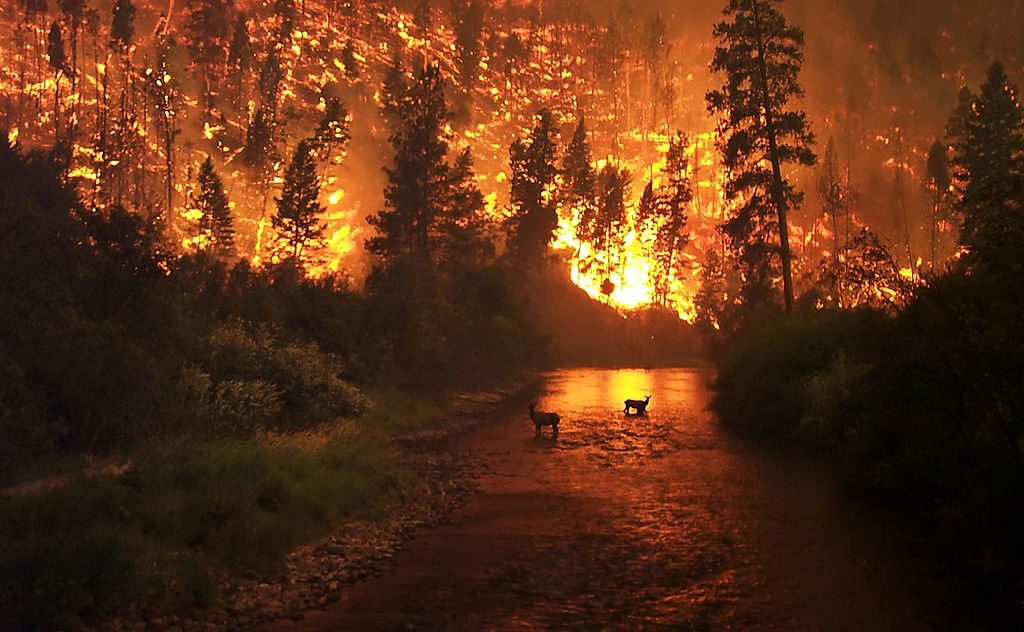 Further on from that, the Tiger/Pig combination can indicate litigation, gossiping and general verbal mischief. This, along with the Rooster in the Day Pillar, can indicate fire and water disasters. And if we want more doom and gloom, this year is also a double-blind year, not an auspicious indicator, meaning that the Li Chun (1st day of spring in the Chinese solar calendar) does not appear in the year at all. It speaks of a lack of direction and a general loss of focus on objectives. This can be helpful, though, because if there are more nefarious efforts afoot, like we see currently in Venezuela for instance, in general it indicates such initiatives will tend to fizzle out over time as a result of poor planning or misapplication. In all, then, the way to look at this year is as one where more creative solutions to problems should be brought forward, that aspects of existing orders which are not working either need tweaking or complete overhaul – in other words, a fresh approach to existing challenges. It will be a year where people who can ‘think outside the box’ can make great advances. It will be especially advantageous, then, for people who have the Monkey, Dragon, Sheep, Horse or Rat in their Four Pillars, depending on where those are placed.
Further on from that, the Tiger/Pig combination can indicate litigation, gossiping and general verbal mischief. This, along with the Rooster in the Day Pillar, can indicate fire and water disasters. And if we want more doom and gloom, this year is also a double-blind year, not an auspicious indicator, meaning that the Li Chun (1st day of spring in the Chinese solar calendar) does not appear in the year at all. It speaks of a lack of direction and a general loss of focus on objectives. This can be helpful, though, because if there are more nefarious efforts afoot, like we see currently in Venezuela for instance, in general it indicates such initiatives will tend to fizzle out over time as a result of poor planning or misapplication. In all, then, the way to look at this year is as one where more creative solutions to problems should be brought forward, that aspects of existing orders which are not working either need tweaking or complete overhaul – in other words, a fresh approach to existing challenges. It will be a year where people who can ‘think outside the box’ can make great advances. It will be especially advantageous, then, for people who have the Monkey, Dragon, Sheep, Horse or Rat in their Four Pillars, depending on where those are placed.
To round this out before moving on to world events, the key thoughts for the Monastic Pig are: Achievement is only half the job. After any successful effort (there is the catch) the creditors have to be paid and the debris that has been accumulated has to be cleared away. Great changes are made by gathering together small things. This is not a Pig that has a spectacular sort of emphasis, then. Rather, it is one that takes stock of things and makes detailed plans for the future, making certain that all accounts are paid in full, that all contracts are in order and so forth. Yin Earth, as we see in the Year Master (the element that governs the year), favors Rats, Horses, Monkeys and Roosters, as outlined in the previous paragraph. And as we will see in the forecast to come, the year will favor more progressive and revolutionary movements, while at the same time putting the status quo on notice and overturning existing orders. And given the financial leanings of this particular Pig, the key areas of progress/trouble relate to finances. With that, we move on to an examination of events from last year and the projected ones we will likely see as the year unfolds.
 Looking at what was forecast for the Year of the Mountain Dog and what actually did come to pass, we will preface the above points by saying that, thankfully, there were no major conflicts. This was due primarily due to the patience and forbearance of the Russians, Iranians and Syrians. There were attempts, primarily by Israel, to cause a wider conflict, but which in the end resulted in significant setbacks for the Israelis instead. This is covered in linked articles to follow. But as a result of the preceding, we also saw significant increases in defense spending in 2018 among NATO members. That was due primarily to reactionary politics in their continuing push for tensions with Russia in order to justify that spending. As to revolutions in smaller countries, we had the Velvet Revolution in Armenia. However, there is a growing sense of revolution in places like France, Britain and other EU nations (we’ll watch that space as 2019 unfolds). Those brewing revolutions are a reaction to the reactionary politics in those nations and their neo-liberal economic policies.
Looking at what was forecast for the Year of the Mountain Dog and what actually did come to pass, we will preface the above points by saying that, thankfully, there were no major conflicts. This was due primarily due to the patience and forbearance of the Russians, Iranians and Syrians. There were attempts, primarily by Israel, to cause a wider conflict, but which in the end resulted in significant setbacks for the Israelis instead. This is covered in linked articles to follow. But as a result of the preceding, we also saw significant increases in defense spending in 2018 among NATO members. That was due primarily to reactionary politics in their continuing push for tensions with Russia in order to justify that spending. As to revolutions in smaller countries, we had the Velvet Revolution in Armenia. However, there is a growing sense of revolution in places like France, Britain and other EU nations (we’ll watch that space as 2019 unfolds). Those brewing revolutions are a reaction to the reactionary politics in those nations and their neo-liberal economic policies.
As to major disasters, there was quite a list. Climate-related disasters, like the California, British Columbia, Swedish and Greek wildfires will increase, along with hurricanes, typhoons, flooding, drought, extremes of cold and heat, etc. We also saw some significant geologic activity in 2018, mostly in Indonesia in terms of loss of life. For conservatives in politics it was a mixed bag. Trump suffered a setback in the US with Democrats taking control of the House. But we also saw the election of Bolsonaro in Brazil, although he might soon be deposed, and other farther right wins in Europe. The big moves by China were put on hold by the trade war with the US, at least temporarily, but this is only leading China to seek other trading partners and to accelerate its search for other modes of payment. And to end this summary, always one of my favorites, 2018 was a big year in space, with China taking the lead in launches and innovation, linked below with its Chang’e-4 success. There were also advances in gene therapy as well as setbacks, but not so much in chemistry and material sciences.
The most significant single events that did happen on the world stage, the events that will shape the future are as follows:
- The Skripal incident (and here)
- Xi Jinping appointed president for life
- The announcement regarding the new Russian weapons
- Rapprochement between the Koreas
- US withdrawal from the JCPOA
- Trump’s trade wars are started
- Convention on the legal status of the Caspian Sea
- Increasing instability on world stock markets
- The Kerch Strait incident
- Heightened tensions within NATO (and here)
- The rapid winding down of the war in Syria (the ‘empire’ has blinked, several times)
- The gilet jaunes protests in France and ongoing Brexit dramas (here, here and here)
- The Chinese Chang-e 4 lunar mission to the far side of the moon
- The Trump administration has effectively pulled out of the INF Treaty
 A synthesis of all the preceding events provides some insights into the trends we will see in 2019. As stated at the start of this letter, finances and economy will be the major theme and driver this year. The events that tie in with this are the withdrawal from the JCPOA, the trade wars, and instability in the stock markets. The withdrawal from the JCPOA is accelerating the setting up of payment alternatives to the US dollar, the world’s main reserve currency. This is causing unseen instability and insecurity in Western financial circles, who will seek to stop this at heavy cost. It is the main contributing factor to tensions between the West and the Russia-China axis, who offer alternatives to payment in USD dollars. We can add to the mix the growing tensions with Venezuela, itself setting up alternative payment systems (also here and here), and who is now inviting Russia to contribute militarily to its security, much as we saw with Syria. (see here, here and here). This has elevated tensions in the Caribbean basin, which may result in wars there in coming years. This would be very similar to what we saw with the ‘seven countries in five years’ doctrine of the neocons toward the Middle East, this time aimed at Latin America.
A synthesis of all the preceding events provides some insights into the trends we will see in 2019. As stated at the start of this letter, finances and economy will be the major theme and driver this year. The events that tie in with this are the withdrawal from the JCPOA, the trade wars, and instability in the stock markets. The withdrawal from the JCPOA is accelerating the setting up of payment alternatives to the US dollar, the world’s main reserve currency. This is causing unseen instability and insecurity in Western financial circles, who will seek to stop this at heavy cost. It is the main contributing factor to tensions between the West and the Russia-China axis, who offer alternatives to payment in USD dollars. We can add to the mix the growing tensions with Venezuela, itself setting up alternative payment systems (also here and here), and who is now inviting Russia to contribute militarily to its security, much as we saw with Syria. (see here, here and here). This has elevated tensions in the Caribbean basin, which may result in wars there in coming years. This would be very similar to what we saw with the ‘seven countries in five years’ doctrine of the neocons toward the Middle East, this time aimed at Latin America.
One of the aims of attacking the countries of the Caribbean region is to stop the spread of socialism, seen as the main threat to neo-liberal financial capitalism. The other aim is energy dominance and an alternative to OPEC, of which Venezuela is now the acting head for the year. The threat of socialism and alternative currencies is also why there have been smear campaigns against Jeremy Corbyn in the UK, who wants to dismantle the economic realm set in place by Margaret Thatcher. Russia and China represent the same sort of threat to the West, as does Iran. These are the primary ‘threat theaters’ we will hear about in 2019 and over the next years – Venezuela, Iran, China, Russia, Cuba…There’s a clear pattern.
 And then there are issues like the creation in the US of a Space Force and Space Command. This harks back to Reagan’s ‘Star Wars’, but is in fact a reaction to the recent advances in Russian and Chinese space technology. The recent landing of the Chang’e-4 lunar lander of the Chinese on the far side of the moon has only accelerated the plans of the US defense industries, like Trump’s announcement of the Space Force, with the need to “confront adversaries” in that area, referring specifically to Russia and China. Such an initiative would be prohibitively expensive and further bankrupt the country. Reagan’s ‘Star Wars’ was abandoned for the same reason. But this also follows on from Russia’s announcements and demonstrations of its new weapons systems, with further developments there of anti-satellite systems. The Chinese have already developed such a weapon. What is the use of a Space Force then, if missiles from the ground can destroy the space-based weapons? Whatever happened to peaceful cooperation in space and of taking care of things here on earth instead?
And then there are issues like the creation in the US of a Space Force and Space Command. This harks back to Reagan’s ‘Star Wars’, but is in fact a reaction to the recent advances in Russian and Chinese space technology. The recent landing of the Chang’e-4 lunar lander of the Chinese on the far side of the moon has only accelerated the plans of the US defense industries, like Trump’s announcement of the Space Force, with the need to “confront adversaries” in that area, referring specifically to Russia and China. Such an initiative would be prohibitively expensive and further bankrupt the country. Reagan’s ‘Star Wars’ was abandoned for the same reason. But this also follows on from Russia’s announcements and demonstrations of its new weapons systems, with further developments there of anti-satellite systems. The Chinese have already developed such a weapon. What is the use of a Space Force then, if missiles from the ground can destroy the space-based weapons? Whatever happened to peaceful cooperation in space and of taking care of things here on earth instead?
 There are also significant shifts in Middle East geopolitics, with the West making plans for a wider conflict in order to shore up its flagging influence there, being rapidly replaced by Russia and China. These were accelerated by the Khashoggi affair, the withdrawal from the JCPOA, the rapid winding down of the war in Syria, the Convention on the Caspian Sea, and evidenced by the US withdrawal from Syria (which is actually only Trump removing the troops he has added since taking office) and a corresponding beefing up of the military presence in Iraq, along with Israeli attacks on Syria in recent days and talks of the Turks taking over in northern Syria. The latter will likely turn out to be smoke and mirrors, as Turkey is ill-placed for an occupation of northern Syria. And then we also see Arab nations reopening their consulates in Damascus. Finally, there will be elections in Israel this year and Netanyahu is facing possible legal actions for fraud.
There are also significant shifts in Middle East geopolitics, with the West making plans for a wider conflict in order to shore up its flagging influence there, being rapidly replaced by Russia and China. These were accelerated by the Khashoggi affair, the withdrawal from the JCPOA, the rapid winding down of the war in Syria, the Convention on the Caspian Sea, and evidenced by the US withdrawal from Syria (which is actually only Trump removing the troops he has added since taking office) and a corresponding beefing up of the military presence in Iraq, along with Israeli attacks on Syria in recent days and talks of the Turks taking over in northern Syria. The latter will likely turn out to be smoke and mirrors, as Turkey is ill-placed for an occupation of northern Syria. And then we also see Arab nations reopening their consulates in Damascus. Finally, there will be elections in Israel this year and Netanyahu is facing possible legal actions for fraud.
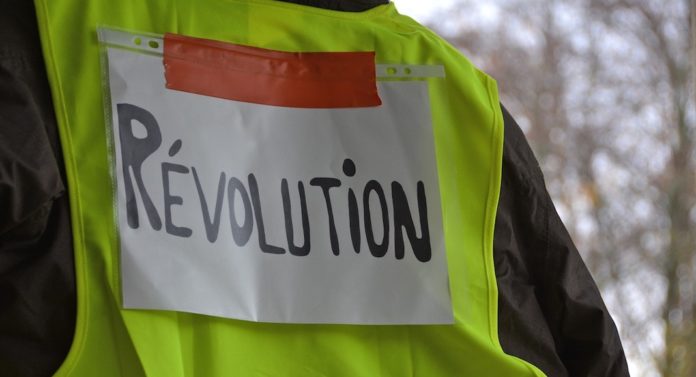 But the biggest news from last year that has set the tone for this year can be seen in the jilet jaunes protests in France and neighboring EU states, the ongoing Brexit drama which is rapidly moving toward a hard Brexit (something long planned by far-right conservatives there), Trump’s trade wars and the damage they are causing (largely to Trump’s supporters) and the rapid increase in volatility of stock markets worldwide, but particularly in the US. What we are actually seeing is the dawn of change in our world financial system. The current system is based on debt, has disadvantaged the average citizen, has rapidly increased the wealth of a very few people, and so forth. This is why we are seeing protests.
But the biggest news from last year that has set the tone for this year can be seen in the jilet jaunes protests in France and neighboring EU states, the ongoing Brexit drama which is rapidly moving toward a hard Brexit (something long planned by far-right conservatives there), Trump’s trade wars and the damage they are causing (largely to Trump’s supporters) and the rapid increase in volatility of stock markets worldwide, but particularly in the US. What we are actually seeing is the dawn of change in our world financial system. The current system is based on debt, has disadvantaged the average citizen, has rapidly increased the wealth of a very few people, and so forth. This is why we are seeing protests.
The reality on the ground is quite different to what we hear in the media about a ‘booming economy’ (and here), a ‘soaring stock market’, ‘millions of new jobs’ and the like. The stock market is high because it is a bubble and is based in corporate stock buy-backs. It has nothing to do with real economic growth. The true economy has actually been quite stagnant in the West and Japan since 2008. Those millions of new jobs are in areas that no one really wants to pursue – temporary, low-paid positions like fast food, cleaning jobs, ‘gig jobs’, temp jobs and so forth. Added to this is the fact that large numbers of people are leaving the work force. In effect, then, what we are seeing is a good case of ‘cooking the books’, especially in the US.
Looking ahead, then, and taking our cues from history, there are several very interesting developments underway. The historical precedents are listed at the end of this letter.
- Setbacks for the US and the West in the Caribbean region
- Advances in water transport, such as the E40 waterway, for instance (and here).
- Troubles in the Far East, largely about trade
- Elevation of conflicts in Africa
- Advances in hypersonic flight (including weapons systems)
- More widespread protests/rebellions in the West
- Moves at lessening corporate power in the West
- Changes to come in China, with economic factors being the catalyst, possibly around Tibet as well.
- Turkey reined back in Syria (and probably Syria regaining all of its territory)
- Possibly some legal move around the rights of children (said by Alice Bailey to be introduced by Russia at some point in the decades after WWII and then be universal)
- The beginnings of reform in the EU
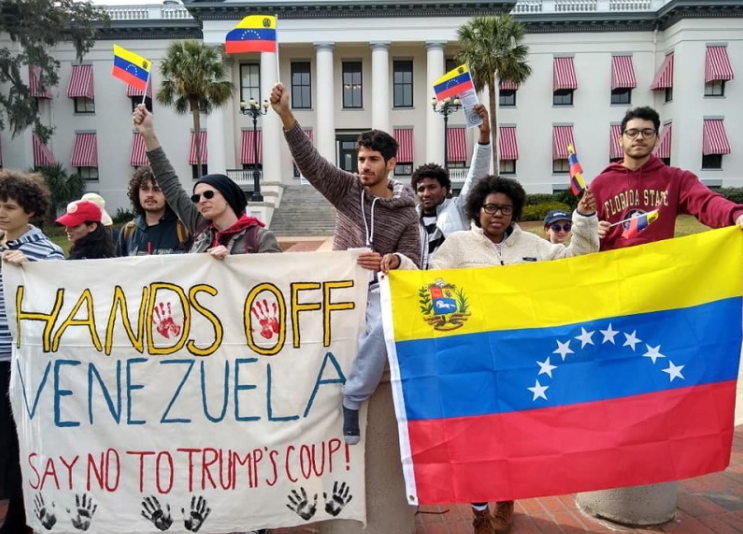 As to what shape these points might take this time around, we’ll start with the Caribbean. Presently there is an attempted coup taking place in Venezuela, fomented by the US and gathering support among the right wing governments in Latin America (the Lima Group). It is likely to fail. Neither the demographics of Venezuela nor the astrology supports a coup. For my preliminary analysis of that situation, see here. And Russia and China are making inroads there. In South America there are only three left-leaning or socialist governments remaining – Venezuela, Bolivia and Uruguay. In Central America it is much the same, with only El Salvador and Guatemala remaining left-wing. Mexico has just turned to the left. But to a wider point, the US, along with Israel and Britain, appears to be preparing for regime change in the Caribbean basin, mainly in Cuba and Venezuela, over the next decade now that right-leaning governments are in place. This will result in rising Russian and probably Chinese influence in the entire region, not just in Venezuela. A setup for a future version of the Cuban missile crisis? If so, as before, Turkey is again involved in the setup, having become an important partner for Venezuela, at least for now. And we will probably see increased economic pressure placed on Cuba by the US.
As to what shape these points might take this time around, we’ll start with the Caribbean. Presently there is an attempted coup taking place in Venezuela, fomented by the US and gathering support among the right wing governments in Latin America (the Lima Group). It is likely to fail. Neither the demographics of Venezuela nor the astrology supports a coup. For my preliminary analysis of that situation, see here. And Russia and China are making inroads there. In South America there are only three left-leaning or socialist governments remaining – Venezuela, Bolivia and Uruguay. In Central America it is much the same, with only El Salvador and Guatemala remaining left-wing. Mexico has just turned to the left. But to a wider point, the US, along with Israel and Britain, appears to be preparing for regime change in the Caribbean basin, mainly in Cuba and Venezuela, over the next decade now that right-leaning governments are in place. This will result in rising Russian and probably Chinese influence in the entire region, not just in Venezuela. A setup for a future version of the Cuban missile crisis? If so, as before, Turkey is again involved in the setup, having become an important partner for Venezuela, at least for now. And we will probably see increased economic pressure placed on Cuba by the US.
As to the Middle East, the Turks and Russians have reached an agreement on the Idlib sector in Syria, where Turkish-backed rebels have been routed by more militant groups. The Turks will be unable to expand their territory into Syria. Their economy is under considerable stress and they would be fighting a long guerilla war there with the indigenous population, which would not go well with the Turkish population. And by the same token, any long-term hopes of an autonomous Kurdish state are just that – hopes. Having been abandoned by the US, now they face a future of being re-integrated into the Syrian state. The move now by the West is to intensify the NATO presence in the Middle East, particularly in Iraq. Trump has stated the matter clearly on diverse occasions. There is nothing in Syria that the US wants. As he said, only “sand and death”, and saying as well that the US should take Iraq’s oil as a spoil of war. The real prize worth keeping is not Syria, but Iraq, which has 10 – 12% of the world’s oil reserves, second only to Saudi Arabia and Venezuela, the latter two being fairly equal. Syria was meant to be a stepping stone to Iran, which has the 4th-largest reserves of oil in the world. This latter point is why we see so much interest by the US and UK in overturning the socialist government in Venezuela and why there is a concerted attempt to overthrow the Iranian government.
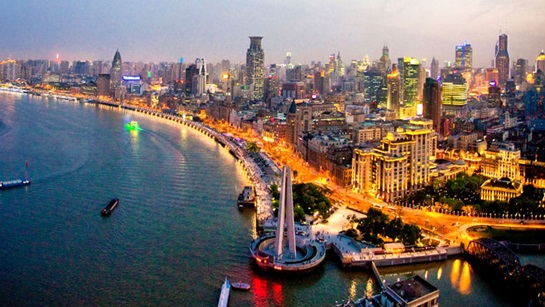 China faces considerable pressures, both from without and within. It faces future pressures from its autocratic leadership, extreme censorship, which will increasingly grate on its people, and a rapidly decreasing birth rate, coupled with its aging population. Financial pressures will come from a lack of openness in technology, an ill-placed massive stimulus which patches symptoms instead of addressing real problems, and over-capacity. This, along with trade pressures internationally. If there is a world-wide downturn economically, that over-capacity plus its increasing debt load will cause significant problems, much as we saw with Japan, which is facing its own problems. China faces also pressures from its minorities, such as the Tibetans and the Uighurs, with international scrutiny being particularly focused on those two groups, either rightly or wrongly. But tensions remain.
China faces considerable pressures, both from without and within. It faces future pressures from its autocratic leadership, extreme censorship, which will increasingly grate on its people, and a rapidly decreasing birth rate, coupled with its aging population. Financial pressures will come from a lack of openness in technology, an ill-placed massive stimulus which patches symptoms instead of addressing real problems, and over-capacity. This, along with trade pressures internationally. If there is a world-wide downturn economically, that over-capacity plus its increasing debt load will cause significant problems, much as we saw with Japan, which is facing its own problems. China faces also pressures from its minorities, such as the Tibetans and the Uighurs, with international scrutiny being particularly focused on those two groups, either rightly or wrongly. But tensions remain.
And even though China has pulled half of its population out of the worst forms of poverty, which is admirable, it still faces an uphill battle and with world financial pressures increasing, even when not directed at China, and that struggle will only get worse. Along with its aging population, it will need to increase its population somehow in order to keep its production levels high. So, even though China has demonstrated extraordinary growth in recent years, it also faces daunting problems. If the leadership cannot adapt to those changing parameters, then the possible “very great changes coming to China” in the next few years forecast by the Dalai Lama may very well not go the way in which Xi Jinping envisions. Then again, stranger things have happened. A ‘Tibetan uprising’ may manifest this time as a resurgence of Buddhism in China instead of insurrection, and open acceptance of the Dalai Lama there, which would lead to a deep period of healing not just for Tibetans and Chinese, but for all other minorities in China and in the region as well. Who can say?
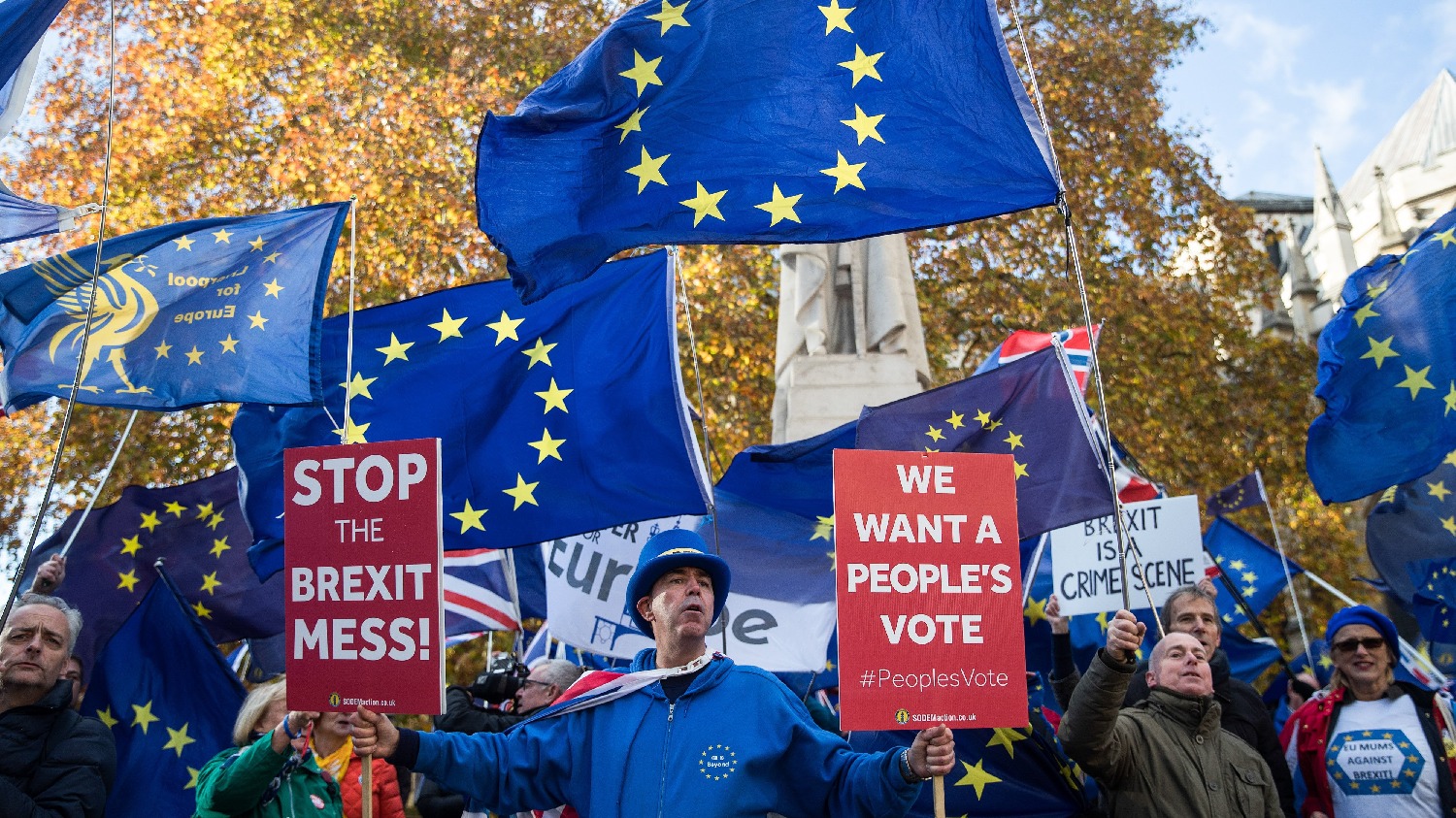 Protests in the West will grow. Of that there is little doubt. The worsening conditions for the average citizen in the West under the economic model of the past four decades ensures it. This continues the main theme for the year, which is financial. France is leading the charge in Europe. The social climate in Europe is going to be quite volatile this year, and the Brexit drama in the UK is going to be a catalyst for many economic changes in the EU, and in the UK too. There is currently capital and company flight from the UK to the continental states as the deadline approaches for exit. The protests we see in France will erupt in the UK if the Brexiteers have their way, which from the UK’s astrology looks quite probable. They want to perform ‘shock therapy’ on the UK, sort of Thatcherism on steroids, with promises of economic growth and so forth. The UK is undergoing one of the most significant ‘life lessons’ and milestones in its history (also here and here). That milestone hopefully will not mark the end of the road for the UK. But the worst fears of the Leavers there are more likely than not to manifest – calls for more socialism in the UK. Those calls will come from public pressure. The sitting government will be under considerable and increasing pressure in the next months.
Protests in the West will grow. Of that there is little doubt. The worsening conditions for the average citizen in the West under the economic model of the past four decades ensures it. This continues the main theme for the year, which is financial. France is leading the charge in Europe. The social climate in Europe is going to be quite volatile this year, and the Brexit drama in the UK is going to be a catalyst for many economic changes in the EU, and in the UK too. There is currently capital and company flight from the UK to the continental states as the deadline approaches for exit. The protests we see in France will erupt in the UK if the Brexiteers have their way, which from the UK’s astrology looks quite probable. They want to perform ‘shock therapy’ on the UK, sort of Thatcherism on steroids, with promises of economic growth and so forth. The UK is undergoing one of the most significant ‘life lessons’ and milestones in its history (also here and here). That milestone hopefully will not mark the end of the road for the UK. But the worst fears of the Leavers there are more likely than not to manifest – calls for more socialism in the UK. Those calls will come from public pressure. The sitting government will be under considerable and increasing pressure in the next months.
We are seeing the same calls in France – a return to focus on public welfare instead of austerity. All this talk of sovereignty that we hear in Europe and the US refers to people being able to forge their own economic and cultural destiny. But with the continent the focus will turn to the big three – Italy, France and Germany. The lessons of the Greek financial crisis are very fresh in people’s minds. The governments of France and Germany are also under increasing pressure, with Macron looking for salvation and Merkel on the ropes, hanging on by a thread and with the right wing whittling away at her majority. There are even rumblings now of a ‘Dexit’, should things go further south for the EU. There are parliamentary elections for the EU, and they will mark a turning point for the Union, probably prompting reorganization at some level. I do not see a breakup. If the EU can reorganize itself along the lines of looser federation, returning a level of autonomy in economic and migration matters to the member states, then the breakup can be averted. There again, we will have to wait and see. But if that does happen to take place, then corporate influence will be checked to a degree with the globalist agendas set back. But that would also send tremors through NATO.
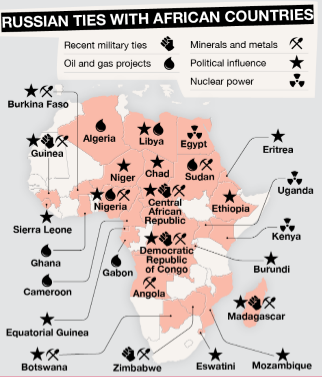 As to Africa, great power competition is shifting there as well, with China and Russia making inroads increasingly. The ex-colonial powers, like France, are said to be ‘unnerved’ at the prospect. Various African delegations have been visiting Moscow in recent years. BRICS, which includes South Africa, is a going concern. Russia has projects and cooperation in various areas in over ¾ of the continent. The US has troops stationed over almost all of Africa, and has established AFRICOM, the US-Africa military command. As yet it is a small number of troops, but they are there nonetheless. These are early days for Russian influence, but already the propaganda machine in the US is bemoaning their presence. China has increasing influence in Africa, too, seeking to make the continent an integral part of its B&R Initiative. Since 2010 China has invested heavily in Africa, and perceptions of Chinese by Africans on the whole are generally favorable, with a few exceptions. With such a buildup between the three greatest world powers it is not difficult to imagine there may be some conflicts that arise between them. But the trend is for the old colonial powers, like France, Belgium, Britain and Germany, to lose influence there. The conflicts in the past were between the colonial powers, but those days are long gone. Then again, there is oil.
As to Africa, great power competition is shifting there as well, with China and Russia making inroads increasingly. The ex-colonial powers, like France, are said to be ‘unnerved’ at the prospect. Various African delegations have been visiting Moscow in recent years. BRICS, which includes South Africa, is a going concern. Russia has projects and cooperation in various areas in over ¾ of the continent. The US has troops stationed over almost all of Africa, and has established AFRICOM, the US-Africa military command. As yet it is a small number of troops, but they are there nonetheless. These are early days for Russian influence, but already the propaganda machine in the US is bemoaning their presence. China has increasing influence in Africa, too, seeking to make the continent an integral part of its B&R Initiative. Since 2010 China has invested heavily in Africa, and perceptions of Chinese by Africans on the whole are generally favorable, with a few exceptions. With such a buildup between the three greatest world powers it is not difficult to imagine there may be some conflicts that arise between them. But the trend is for the old colonial powers, like France, Belgium, Britain and Germany, to lose influence there. The conflicts in the past were between the colonial powers, but those days are long gone. Then again, there is oil.
Oil has recently been found by the Spanish oil concern Repsol in the Taoudeni Basin, the largest part of which is in Mauritania. That basin lies under the sands of the Sahara Desert. It also extends into Mali and Algeria. From 1904 to 1964 almost the whole of Northwest Africa were French colonies. Thus the French still have large interests there and old connections. But France recently intervened in Mali, presumably to stop the rise of Islamic fundamentalism. Repsol also recently discovered a large gas reserve in Algeria, close to the Libyan border. So, we will see European, American, Australian, Russian and Chinese interests all competing for their piece of the energy pie in North Africa, as well as in other areas, at the same time parroting the need to ‘fight fundamentalist Islamic forces’, which are also active in those areas. One has to wonder what is really going on there, in contrast to what we hear in the media.
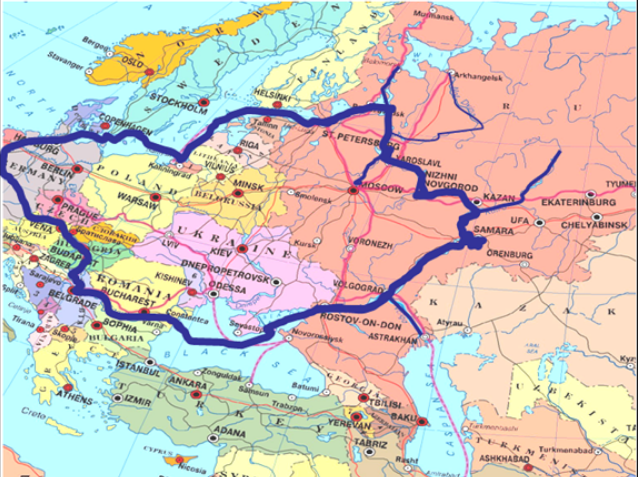 Moving on to waterways, this is a vast untapped potential and resource in much of the world. Although there are environmental concerns, and not wholly without merit, transport by water is by far the cheapest mode of shipment. It is also the least polluting, as it turns out, and when one considers volume of cargo in relation to time, it is the fastest mode of shipping. The main concerns environmentally are from spills. The Black, Baltic and Caspian seas in Europe and Asia are major transport routes, and as such are strategically contested, as is the South China Sea, the Red Sea and the Strait of Hormuz. The Caspian Sea is now off-limits to the West and NATO, which will be a significant boost to the Central Asian region. The Sea of Azov is now essentially Russian waters, where Russia has a waterway outlet (the Don River), whereas Ukraine does not.
Moving on to waterways, this is a vast untapped potential and resource in much of the world. Although there are environmental concerns, and not wholly without merit, transport by water is by far the cheapest mode of shipment. It is also the least polluting, as it turns out, and when one considers volume of cargo in relation to time, it is the fastest mode of shipping. The main concerns environmentally are from spills. The Black, Baltic and Caspian seas in Europe and Asia are major transport routes, and as such are strategically contested, as is the South China Sea, the Red Sea and the Strait of Hormuz. The Caspian Sea is now off-limits to the West and NATO, which will be a significant boost to the Central Asian region. The Sea of Azov is now essentially Russian waters, where Russia has a waterway outlet (the Don River), whereas Ukraine does not.
The Don River is a major shipping route. It, along with the Volga-Don Canal, connects the Caspian Sea with the Sea of Azov. The Sea of Azov is thus quite a significant strategic area for Russia, especially. The Black Sea is a potential hotspot, with NATO rattling sabers there. Russia is planning extensive infrastructure projects to its waterways. The major waterways under development in the world are in Russia, China and India, with talk of a big project in Brazil. There are two proposals for a canal from the Caspian Sea to the Indian Ocean or Persian Gulf through Iran. The Nicaragua Canal appears to be dead now, at least for the moment, with Chinese attention having shifted to Panama. The Hidrovia Parana-Paraguay waterway needs serious attention and upgrades to be more viable. There has been a proposal for the Kra Canal across the arm of Thailand, which would benefit China. If there is to be a conflict it is likely to come in the South China Sea, which takes us to Southeast Asia.
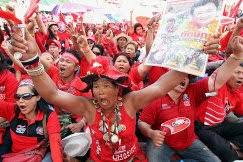 The entire region of Southeast Asia is considered to be a region of emerging economies. It is also an old colonial battleground, and as such has been widely pillaged of its resources in the past, with its cultures having been severely degraded. Much of the region is tied to Western financial control, but that is changing with Chinese influence. As a result, Washington has stepped up its activities there in recent years, with attempts at a color revolution in Thailand, for instance. Western media has been actively smearing the Thai military and government for years, all the while calling violent protests ‘calls for democracy’. But Thailand has been quite resistant and resilient against such efforts, making moves away from Washington and toward Russia, China and the EU. The Obama administration sought to offset Chinese influence in the region in particular with its ‘pivot to Asia’ policy. It is a policy that has backfired. Instead of ‘containing China’, it has caused China to become more concerted at its efforts in the region, with the result that the ASEAN nations are seeking greater cooperation with China instead of moving away from it. This is another region that needs to be watched for possible conflicts. Sitting on China’s doorstep, as a region it is a natural trading partner with China, and also prime candidates for its B&R Initiative, but Western meddling in the affairs of those states continues, along with efforts at economic inroads.
The entire region of Southeast Asia is considered to be a region of emerging economies. It is also an old colonial battleground, and as such has been widely pillaged of its resources in the past, with its cultures having been severely degraded. Much of the region is tied to Western financial control, but that is changing with Chinese influence. As a result, Washington has stepped up its activities there in recent years, with attempts at a color revolution in Thailand, for instance. Western media has been actively smearing the Thai military and government for years, all the while calling violent protests ‘calls for democracy’. But Thailand has been quite resistant and resilient against such efforts, making moves away from Washington and toward Russia, China and the EU. The Obama administration sought to offset Chinese influence in the region in particular with its ‘pivot to Asia’ policy. It is a policy that has backfired. Instead of ‘containing China’, it has caused China to become more concerted at its efforts in the region, with the result that the ASEAN nations are seeking greater cooperation with China instead of moving away from it. This is another region that needs to be watched for possible conflicts. Sitting on China’s doorstep, as a region it is a natural trading partner with China, and also prime candidates for its B&R Initiative, but Western meddling in the affairs of those states continues, along with efforts at economic inroads.
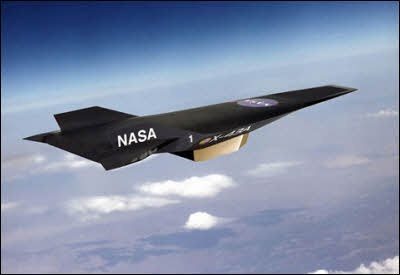 As to advances in hypersonic flight and technology, the largest part of those advances by far will be in the area of weaponry, with the US now highly motivated to develop such weapons. This follows on the heels of the Russian advances in those weapons as outlined by Vladimir Putin in his March 2018 state of the nation address. The Chinese also have their versions of such weapons and are catching up to the Russians. The big efforts now are in counteracting them. But as is often the case, advances in military technology are then made available to the public sector. In the past we had the supersonic Concorde, which was dropped after the crash of Flight 4590. But that was not a hypersonic aircraft. Its maximum speed was only Mach 2, or twice the speed of sound. Hypersonic craft are design to fly at speeds of Mach 5 and above. The only flight thus far of a hypersonic aircraft that was not a weapon was a 3.5 minute flight of an American aircraft, the X-51, unmanned, which crashed into the ocean in a controlled crash. It was thereafter deemed impractical to develop such aircraft. We will have to wait for some decades probably before we see an effective and safe commercial hypersonic aircraft, but the beginnings are to be found in the weaponry.
As to advances in hypersonic flight and technology, the largest part of those advances by far will be in the area of weaponry, with the US now highly motivated to develop such weapons. This follows on the heels of the Russian advances in those weapons as outlined by Vladimir Putin in his March 2018 state of the nation address. The Chinese also have their versions of such weapons and are catching up to the Russians. The big efforts now are in counteracting them. But as is often the case, advances in military technology are then made available to the public sector. In the past we had the supersonic Concorde, which was dropped after the crash of Flight 4590. But that was not a hypersonic aircraft. Its maximum speed was only Mach 2, or twice the speed of sound. Hypersonic craft are design to fly at speeds of Mach 5 and above. The only flight thus far of a hypersonic aircraft that was not a weapon was a 3.5 minute flight of an American aircraft, the X-51, unmanned, which crashed into the ocean in a controlled crash. It was thereafter deemed impractical to develop such aircraft. We will have to wait for some decades probably before we see an effective and safe commercial hypersonic aircraft, but the beginnings are to be found in the weaponry.
And we will end with our little peek forward with the EU, which I will be addressing as the year goes on. We hear many pundits in alternative and independent media especially saying that the EU will crash and burn, moreover that it is immanent. I wouldn’t be so certain. The Eurozone might collapse, which would not be such a bad thing in many people’s opinion, but the EU itself can continue without it. The Union was founded as an economic union as its basis, with the federalized union being an afterthought. It is that federalized union which is now under intensifying scrutiny, and one of the major reasons given for the Brexit saga. However, if the economic system (neo-liberal, globalist) that is the current model in the EU and the US collapses, as is increasingly likely, the scene is set for major reforms in the EU itself anyway. Significant turning points will be coming for the Union next year, as the pressure is building this year. The elections this year will mark a turning point, with a direction of Ceres to the EU Saturn, the latter ruling public services in the EU chart. Austerity measures have been steadily chipping away at those especially since 2008, and people have had enough. The EU Parliamentary elections will need close scrutiny to see what might eventuate.
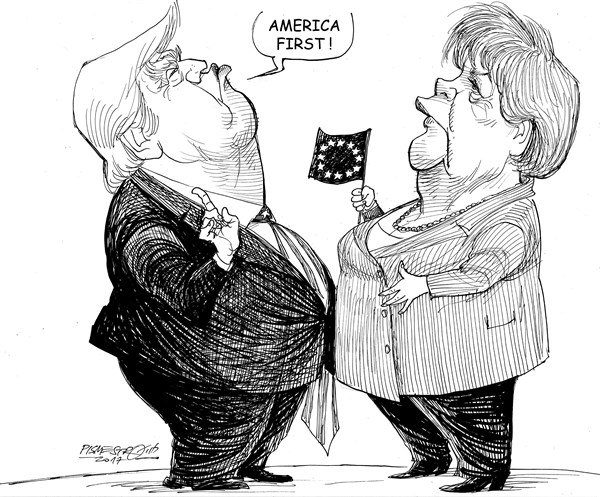 But as an indicator, the EU is moving toward greater independence from Washington, however slowly. France, the UK and Germany have just implemented INSTEX, their program for alternative payment systems for Iran in order to maintain Iran within the framework of the JCPOA, which Trump abandoned last year. This will be seen as a poke in the eye by Washington, and we will see increasing pressures by Washington on EU member states. Such pressures will ultimately only drive Europeans away from Washington, even though they may initially cave in to Washington’s demands. Those pressures by the US also apply to initiatives like Nordstream II between Russia and Germany. And then there are moves by the Swedes toward a cryptocurrency, which could be used to bypass other currencies (Beware of the Kryptonex scam!). Again, INSTEX is yet another example of the financial changes we will see in 2019 and the creative efforts of people and nations to circumvent the status quo that has held sway in economics and geopolitics for the past 40 years.
But as an indicator, the EU is moving toward greater independence from Washington, however slowly. France, the UK and Germany have just implemented INSTEX, their program for alternative payment systems for Iran in order to maintain Iran within the framework of the JCPOA, which Trump abandoned last year. This will be seen as a poke in the eye by Washington, and we will see increasing pressures by Washington on EU member states. Such pressures will ultimately only drive Europeans away from Washington, even though they may initially cave in to Washington’s demands. Those pressures by the US also apply to initiatives like Nordstream II between Russia and Germany. And then there are moves by the Swedes toward a cryptocurrency, which could be used to bypass other currencies (Beware of the Kryptonex scam!). Again, INSTEX is yet another example of the financial changes we will see in 2019 and the creative efforts of people and nations to circumvent the status quo that has held sway in economics and geopolitics for the past 40 years.
From all the preceding, we can see that 2019, like the Year of the Mountain Dog (2018), is going to be a full year. We have the election cycle starting in the US with several Democratic candidates already having announced their bids, and the commentaries that follow thereon will be an endless distraction for the American public from the issues that really matter. It will be likewise for Europe, Australia and much of the world. But watch the markets especially – not the stock markets, but the actual trade and banking figures – to see how the year will really play out. It will be a year of endings, and then of opportunities presented for new initiatives. It is always thus for the Pig years – evaluation, synthesis and a look forward. With these points in mind, I wish you all a happy, safe and productive Year of the Monastic Pig!
Picture credits:
Additional info on the chart of the New Year:
Element Counts (for Beijing):
Wood: 4 - Inventive, very creative, very artistic
Fire: 2 - Active, stimulating
Earth: 1 - Too flexible, yielding
Metal: 2 - Sportive, astute
Water: 3 - Talkative, clear, bright
Birth Phase: Contracting - Winding down, spent force, the wisdom phase, dissemination
Constellation of the day:
Animal: Monkey: Don't break the rules today.
Day Indicator: H – Danger: There is nothing else of use on this day except to stay at home and party.
9 Star QI (CHINESE, for Feng Shui)
Year Number: 8 Yin Earth
Month Number: 2 Yang Earth
House Number: 2 Yang Earth
Trigram: Kun
Past Monastic Pig Years
Feb 7 1959: Fidel Castro becomes Premier of Cuba
Tibetan uprising in Lhasa
First earth object to escape earth’s gravity
St. Lawrence seaway opens to shipping
Dalai Lama escapes Tibet
Explorer 6: first picture of earth from space
First flight of X15 hypersonic aircraft
First large unit battle of Vietnam War
Declaration of the rights of the child by the UN
Feb 10 1899: Aspirin created
1st international radio transmission
Anglo-Boer war (about diamonds and gold)
US Consumers’ League
Standard Oil broken up
Vibrator introduced as home medical device
The first concentration camps (Boer war)
Spanish rule ends in Cuba
Philippine-American war
First juvenile court
Feb 13 1839: First electric telegraph
Baseball invented
British capture Hong Kong
Turks defeated when they cross the Euphrates river in Syria
First commercially available camera
First Opium War
The Newport rising in Britain
A period of reform started in the Ottoman Empire
First ocean-going iron British warship
Feb 16 1779: The Treaty of Aynalıkavak between Russia and Ottomans re: Crimea
Oldest working steam engine was installed, to pump water
Benedict Arnold saga
France and Spain ally against Britain
American Revolutionary War was raging
20 Jan 1719: Europe’s first systematic census
Swedish coast decimated by Russian fleet
Pig Years in General
1911/1971: Farmer Pig/Metal Pig/White Pig
1923/1983: Pig in the Forest/Water Pig/Black Pig
1935/1995: Travelling Pig/Wood Pig/Green Pig
1947/2007: Pig Traversing a Mountain/Fire Pig/Red Pig
Famous Monastic Pigs
Famous Monastic Pigs: John McEnroe (That ball was IN!), Kyle MacLahclan (Twin Peaks), Tom Arnold (Roseanne’s brother), Aidan Quinn (who Staked out Elizabeth Bracco), Kathy Hilton (Paris’ mum), Jens Stoltenberg (NATO), Matthew Modine (“Private Joker”), Irene Cara (What a Feeling!), David Hyde Pierce (Fraser’s brother), Brian Setzer (Stray Cats), Emma Thompson (Love, Actually), Clinton Howard (Opie’s brother), Paula Yates (Mother of Peaches), Sheena Easton (“For Your Eyes Only”), Ben Elton (Blackadder), Loretta Lynch (ex US AG), Morrissey (the Smiths), Mike Pence (US VP), Hugh Laurie (House), Marcus Miller (bassist extraordinaire), The Ultimate Warrior (smacked down in his prime), Khadja Nin (Sambolera), Jim Kerr (Simple Minds), Richie Sambora (Bon Jovie guitarist), Kevin Spacey (now notorious), Rosanna Arquette (Desperately Seeking Susan), Danny Bonaduce (“The Partridge Family”), Magic Johnson (he was magic at the hoops), David Koresh (Branch Davidian), Rebecca DeMornay (Risky Business), Mark “Jacko” Jackson (Aussie rules footballer), Jason Alexander (“Castanza”), Sarah (Duchess of York), Marie Osmond (a little bit country), Ken Watanabe (The Last Samurai), Weird Al Yankovic (‘nuff said), Evo Morales (Pres of Bolivia), Allison Janney (The West Wing), Sean Young (Blade Runner), Judd Nelson (The Breakfast Club), Tracy Ullman (had her own show), Val Kilmer (“Iceman”), Gloria Swanson (star of silent films), Vladimir Nabokov (wrote that book), Duke Ellington (band leader extraordinaire), Fred Astaire (and Ginger Rogers), Tommy Dorsey (Mr. Trombone), James Cagney (Yankee Doodle Dandy), Ernest Hemmingway (The Old Man and the Sea), Alfred Hitchcock (Psycho), Eugene Ormandy (conductor, Philadelphia Orchestra), Hoagy Carmichael (“Stardust”, “Georgia on my Mind”), Noel Coward (“Mad Dogs and Englishmen”), Humphrey Bogart (“Here’s looking at you, kid”), Xavier Cugat (bandleader), John Butler Yeats (Irish artist), John D Rockefeller (oil magnate), Modest Mussorgsky (Night on Bald Mountain), Thomas Moore (“The Last Rose of Summer”), Francis Scott Key (Oh say, can you see?)





